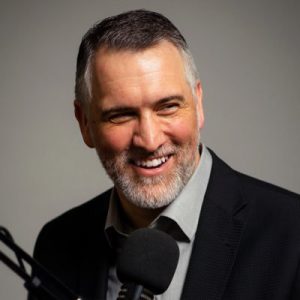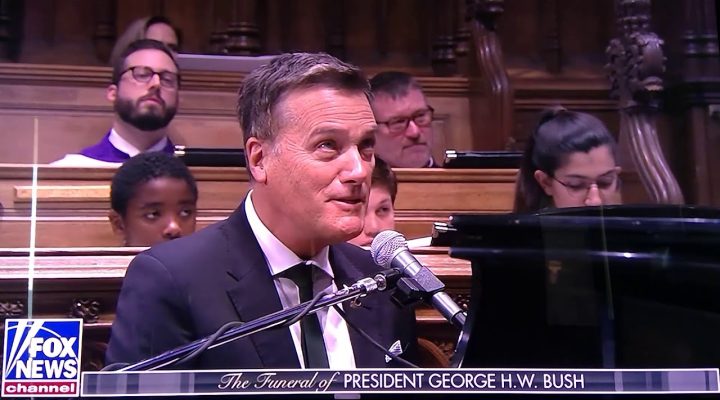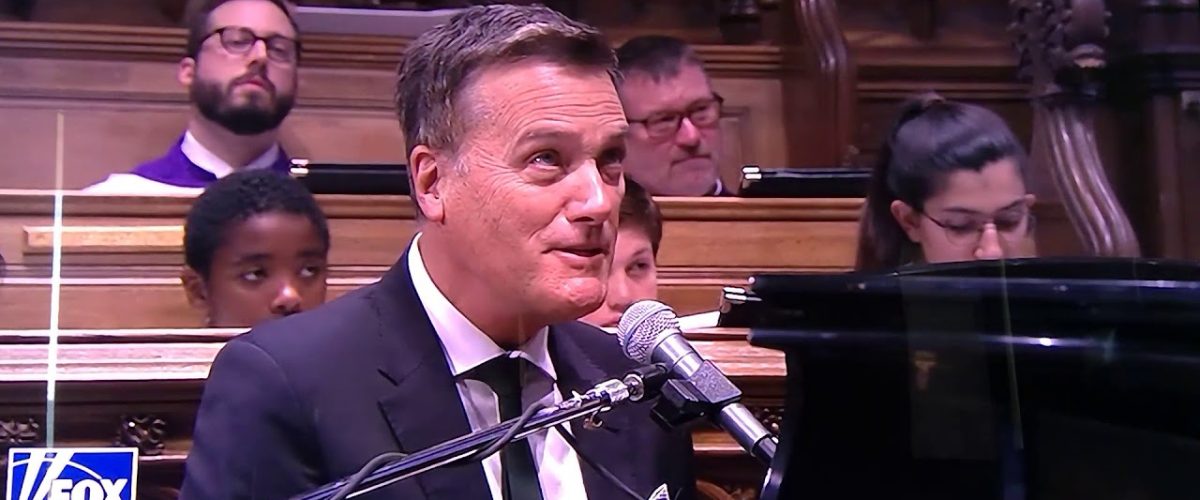There is a reason why one of the most influential worship songs of the past quarter century expresses a truth that could turn evangelicalism upside down and yet has been repeatedly rejected and banned by conservative evangelical complementarian Calvinists.
Growing up in an independent Baptist world where contemporary worship music was categorically condemned, I was a 19-year-old worship leader who would sneak away to the Family Christian Bookstore in the local mall so I could put on the store’s headphones and listen to Paul Baloche and Lenny LeBlanc’s song, “Above All.” Its beautiful simplicity spoke to my soul at a depth that the piano- and organ-led hymns we sang at church simply didn’t reach at the time.
When Michael W. Smith sang the song at a Franklin Graham crusade in Spartanburg, S.C., in 2001, I risked getting expelled from Bob Jones University by attending so I could hear it in person.
While my conscience felt conflicted for listening to contemporary worship music behind the backs of my parents and Christian school, my heart longed for the day when I could lead a congregation of worshipers in “Above All.” Then the summer after my sophomore year at Bob Jones University, I landed my dream job leading worship at an evangelical summer camp.
But during the second week of camp, the camp director pulled me aside and said he wasn’t going to allow me to select “Above All” for any of our worship sets that week because a Calvinist church was going to attend that thought it was theologically wrong. And because I soon became a Calvinist, for the next 18 years, I never was able to lead it in any church I was a member of.
Birthed in the quiet of an empty church
I was relegated to singing “Above All” in secret with the privacy of my piano. But in a sense, my experience with the song in solitude fit well with the song’s origin.

Paul Baloche
“Above All” was birthed in the quietness of an empty church as Paul Baloche sat down at his piano and began to play while reflecting on how great God is. When he shared what he was writing with Lenny LeBlanc, the two of them worked together to finish the song.
“Above All” became one of Baloche’s most influential worship songs, alongside such songs as “Open the Eyes of My Heart,” “Hosanna,” and “Your Name.” It received a nomination for Song of the Year at the Dove Awards in 2002 and 2003.
But neither Baloche nor LeBlanc had any idea the extent to which the song would rise to reach the most powerful men in the world.
Michael W. Smith sings truth to power
At the dawn of the George W. Bush presidency, evangelicals were poised to position themselves as close as they could to the Methodist president who claimed to be born again. But while powerful pastors were flocking to influence public policy, an evangelical musician and worship leader named Michael W. Smith had another message.
With the world’s most powerful people sitting quietly at the 2001 inaugural prayer service, Michael W. Smith sang:
Above all powers, above all kings
Above all nature and all created things
Above all wisdom and all the ways of man
You were here before the world began.
Before the very man who held the authority to begin the longest war the United States had ever waged, Smith was reminding everyone that there was a reality and a power far more ancient and beyond him.
Smith told CCM Magazine at the time about when he first heard the song: “I’ll never forget going, ‘That’s what I’m singing in Washington.’ … I even had cheat sheets on the piano because I had never sung it live before. I had not memorized it. So I had to pull these things out of my pocket and lay them on the piano. Very unprofessional. But I was determined to sing it.”

George W. Bush (R) waves after singer Michael W. Smith (L) performed during an event on the South Lawn of the White House September 8, 2008, in Washington DC. President Bush honored volunteers who serve at home and abroad and called on Americans to volunteer four thousand hours in their lifetime. (Photo by Mark Wilson/Getty Images)
Apparently President Bush loved the song, because he would go on to ask Smith to sing it regularly.
When Baloche heard about Smith singing his song for the president, he told CCM Magazine: “I’m humbled and blown away that a simple prayer of worship, started at my little piano, found its way to the president of the United States. The possibility that this song could be an encouragement to him is such an honor.”
Conservative evangelical complementarian Calvinist men respond
But one group of pastors in particular were not that high on the song.
Bob Kauflin is one of the most influential worship pastors of the past couple decades. In addition to working with CJ Mahaney in Sovereign Grace churches, Kauflin started Sovereign Grace Music 35 years ago, which has become perhaps the most influential producer of worship songs for conservative evangelical, complementarian Calvinist churches. He also led worship for the Together for the Gospel conferences that influenced pastors and congregations worldwide.
On his Worship Matters site, Kauflin said: “Two parts bother me, both near the end of the song. The first is the line ‘you took the fall.’ It seems like an understated way of describing what Jesus did. Not wrong, but not the best. The other problem is the line, ‘and thought of me above all.’ I have no question that Jesus loved me and gave himself for me (Gal. 2:20). But he didn’t think of me ‘above all.’ Jesus went to the cross to satisfy God’s righteous judgment against a sinful humanity. He thought of his Father’s holiness, justice, and glory above all. It may seem like a theological nuance, but it’s the difference between our faith being man-centered and God-centered.”
John Piper of Desiring God agreed with Kauflin, saying: “Here’s another popular lyric that we sang in Asia recently. I wish they weren’t singing this. It’s very popular. ‘Like a rose trampled on the ground / You took the fall / And thought of me / Above all.’ That’s not true. It’s not helpful. I’m not frankly even sure what it means. Above all what? Above all other people whom he saved? No, it can’t be that. Above all his own glory? No, not his own glory. Above all what? That was a beautiful song before it got to that line. He saved us precisely so that we could see and savor his glory as the supreme treasure of the universe above all.”
Gabriel Hughes, pastor of First Southern Baptist Church in Junction City, Kan., added: “Biblically the song is false. … If Christ is above all things, and yet he thinks of us above all things, then he cannot be above all things. He has elevated something higher than himself, and that’s us. … Christ’s ultimate purpose in his incarnation, death, resurrection and ascension was the glory of God. … Jesus saves us from our sin, death and the wrath of God not because he thinks of us as being more important than his own glory, but rather for his glory.”

Leighton Flowers
Leighton Flowers, who spent 13 years as director of youth evangelism for Texas Baptists, relayed a similar conversation at Soteriology 101 about “Above All” that he had with a friend when the song came on the radio: “My friend let out an annoyed grunt, prompting me to ask, ‘What’s wrong?’
‘That song is just so theologically inept,’ my-John-Piper-loving friend exclaimed in disgust.
‘How so?’ I naively inquired.
‘He thought of me, above all? Really, Leighton? You think Jesus thought of us above all? He thought of himself! He thought of HIS OWN GLORY,’ … God does what he does for his own glory, not for us. It is all about him and his glory. That song was probably written by Joel Osteen or something!’”
Subverting our assumptions about glory and worth
Every major human society over the past few thousand years has attempted to structure their relationships as hierarchies of power, with the most glorious and worthy among us at the top being honored and served by those below. And in our development of religion, we have projected that dynamic onto our various gods.
“Above All” taps into these hierarchical dynamics by stating that someone is to be considered higher than all powers, kings, nature and created things. It beautifully depicts a person who is considered higher than all kingdoms, thrones, wonders, wealth and treasure.
Then the final line of the verse says, “There’s no way to measure what you’re worth.”
At this point, one would assume the chorus would conclude with Jesus being at the top.
Jesus’ disciples had this mindset. But after they argued over who was the greatest and would be seated next to the throne, Jesus was high and lifted up on a throne that turned out to be a cross.
Doesn’t it make more sense that the immeasurable worth of God would be in God’s subversion of our dehumanizing, violent assumptions about glory and worth?
By putting the welfare of man above his own self-glorification, God reveals himself to be so much more abundantly glorious than anything we could imagine.”
Flowers says, “By putting the welfare of man above his own self-glorification, God reveals himself to be so much more abundantly glorious than anything we could imagine. The Calvinist seems to think that God’s glory is best manifest by putting his own exaltation first, whereas the example of Christ reveals just the opposite. … In Christ, we find someone who emptied himself of glory so as to serve the needs of his enemies and then he called us to do the same.”
Christian nationalism meets Christian Zionism
Of course, in many evangelicals’ minds, the humiliation of Jesus during his incarnation and crucifixion will be contrasted when he returns to rapture all the evangelicals, plunge the earth into seven years of tribulation, and then comes back on a flying horse to destroy all who do not accept penal substitutionary atonement in a battle so bloody that rivers of blood will flow to the horse’s bridle. Then they believe Jesus will send all non-evangelicals to the fire and brimstone of eternal conscious torment.
This dispensationalist obsession with the end times helped to fuel the Christian Zionist movement that believes modern-day Israel is fulfilling biblical prophecy and that Israel should receive special treatment from American politicians.
Soon after Michael W. Smith sang “Above All” at Bush’s inaugural prayer service and at the White House, the Sept. 11 attacks on the Twin Towers happened. In Jesus and John Wayne, Kristin Du Mez says: “After Sept. 11, the long history of Christian Zionism and heightened interest in the fate of global Christians became intertwined with evangelicals’ commitment to defend Christian America.”

Don Finto
One of the most influential Christian Zionists has been Don Finto, author of Your People Shall Be My People: How Israel, the Jews, and the Christian Church Will Come Together in the Last Days. Finto focuses on converting Jews to Christianity and supporting the state of Israel politically in order to fulfill the end times.
Finto has appeared at rallies for Rick Perry, promoted Donald Trump’s decision to declare “what God declared 3,000 years ago, that Jerusalem is the capital city of Israel,” and he has appeared with Tennessee Gov. Bill Lee, who has led the nation in promoting anti-LGBTQ policies.
Finto also was the pastor of Belmont Church for more than 25 years, where Michael W. Smith was a member. Smith honored Finto by singing at his “60 Years in Ministry” celebration. Smith posted on Facebook back in 2015 that he was with Finto and had “been walking life together for 33 years. Blessed beyond measure!” And Smith, like Finto, has called Gov. Lee “my great friend” and has campaigned for him.
From confronting power to being co-opted by it
As George W. Bush continued to ask Smith to sing “Above All” for him, eventually he asked Smith to write a new song. Du Mez says: “At the 2004 Republican National Convention, Christian recording artist Michael W. Smith stood on the stage of New York’s Madison Square Garden, declaring his love for his president and his country. He then recounted how, only six weeks after the Sept. 11 attacks, he had found himself in the Oval Office with his good friend, President Bush. … ‘Hey W,’ said the presidential ‘W’ to the singer. ‘I think you need to write a song about this.’ Smith did what he was asked. And there, standing before the convention audience as patriotic images flashed on the screen behind him, he performed ‘There She Stands,’ a song about the symbol of the nation, the American flag, standing proudly amid the rubble. It was a small rhetorical step to change the feminine ‘beauty’ all men were created to fight for into the nation herself.”
As one who spent two decades as a worship leader looking up to Michael W. Smith, I would like to believe he’s simply accepting whatever stage is offered to him and may lack awareness of the political implications. But the more I learn about his promotion of politicians, the more I can’t help but wonder to what degree he has been co-opted by power.
In 2015, Donald Trump held a campaign rally with the National Federation of Republican Assemblies at Rocketown, a venue owned by Smith.

Michael W. Smith at the Washington worship rally.
In 2020, Smith led worship on the National Mall in Washington, D.C., for Vice President Mike Pence, singing the lyrics “It’s your breath in our lungs” with 100,000 unmasked unsocially distanced evangelicals during a pandemic that inflamed the lungs and has killed 6.5 million people worldwide.
Then on election night in 2020, Smith’s Rocketown hosted the Turning Point USA convention featuring the likes of Charlie Kirk, Candace Owens, John Rich and Tomi Lahren.
Is Smith simply the owner of a venue that others are using to promote Christian nationalism and Christian Zionism? His associations with Finto and Lee would seem to suggest otherwise.
A song that embodies the story of our problems today
Whatever happened to the Michael W. Smith who fumbled through “Above All” cheat sheets that he pulled out of his pocket and unprofessionally sang to George W. Bush in 2001? How has he gotten so pulled into promoting Republican politicians?
How could the truth of “Above All” turn evangelicalism upside down?
And why have so many conservative evangelical complementarian Calvinist pastors banned “Above All” from being sung in their churches for the past quarter century?
“Hierarchy fractures because it’s top heavy and built by ego.”
Perhaps it’s because “Above All” is the subversion of “how white evangelicals corrupted a faith and fractured a nation.”
It was born in the quiet of an empty church. Its message reveals that immeasurable worth comes not by grasping the heights of hierarchy, but by subverting hierarchy through humility and love.
Conservative evangelical complementarian Calvinists believe in a hierarchical reality arranged in relationships of glory and honor, righteousness and service, holiness and wrath. God is perched at the top of heaven looking down on men who are perched at the top of humanity looking down on women and children.
Hierarchy fractures because it’s top heavy and built by ego. And that fractured fall is exactly the state our nation and evangelicalism find themselves in.
Whether “Above All” is the most poetically exquisite piece of writing or logically consistent is beside the point. What if the problem with “Above All” has more to do with the theological and political games we’ve played with it than with the lyrics of the song?
The point is that it subverts hierarchy by showing that immeasurable worth is in humility and love for others. And if God is willing to take the fall of having God’s hierarchy turned upside down, then shouldn’t we be willing to have our hierarchies turned upside down?
Of course, the conservative evangelical complementarian Calvinists cannot allow that to happen because their power would be lost and their reality would be reversed.
But what if the truth they’ve banned is precisely the truth we need to hear?

Rick Pidcock
Rick Pidcock is a 2004 graduate of Bob Jones University, with a Bachelor of Arts degree in Bible. He’s a freelance writer based in South Carolina and a former Clemons Fellow with BNG. He recently completed a Master of Arts degree in worship from Northern Seminary. He is a stay-at-home father of five children and produces music under the artist name Provoke Wonder. Follow his blog at www.rickpidcock.com.
Related articles:
Faith leaders make a case for Trump to the delight of some and dismay of others
Worship event on National Mall illustrates merger of evangelical music and politics
Rediscovering the songs of lament would wake us up | Opinion by Greg Jarrell


